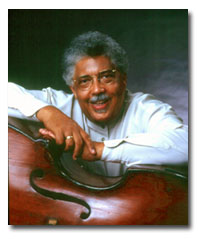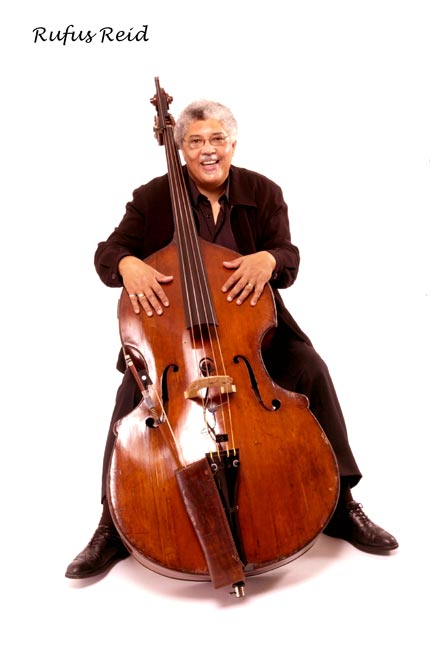Interview with Rufus Reid
 You've played with so many important musicians in your career, like Gillespie, D. Gordon, Art Farmer, McCoy, Stitt, Duke, Milt Jackson, Konitz, Don Byas, ecc, which do you remember nicely? You've played with so many important musicians in your career, like Gillespie, D. Gordon, Art Farmer, McCoy, Stitt, Duke, Milt Jackson, Konitz, Don Byas, ecc, which do you remember nicely?
I have fond memories from all of them, especially Dexter Gordon, Dizzy Gillespie, and Art Farmer who I got to know very well. They were great people as well as being great musicians. I still do some concerts with Lee Konitz. He makes me play differently and I love it.
Which has been more important for your evolution as musician?
Eddie Harris, Dexter Gordon, and Thad Jones were and continue to be pivotal figures for me.
I read that you started as trumpet player, then you mooved to double bass. How your knowing as trumpet player influenced your way of playing bass? Who were the double bassists more important in your education?
I always hear melody even when I am playing bass lines. My favourite double bassist were Ray Brown, Oscar Pettiford, Ron Carter, and Paul Chambers.

You've written the most famous method for jazz bassist, ìThe evolving bassistî, and you are famous as educator, you teach at the Aebersold summer course and you also played in classic orchestra: which do you think are the most evident difference and congruence in education between classic and jazz approach?
Stylistically, orchestral music and jazz music sound very different, but they both require in depth knowledge to play each properly based on documented history. Both require proper execution, dynamic and rhythmic control, unfaltering pitch, emotion, and passion.
Which are the alternative methods you use in your lessons? What do you think about new didactic method of great bass player like Rabbath, Karr, Petracchi?
It always varies depending on the needs of the student. I never have only one way! That is dangerous. There is not only one way to do something.I think all of these virtuoso players have found a way to play the bass that has become their center, but I know they have combined many approaches to find their own approach. I think we bassist, myself included, must keep studying from many sources to find your own way to fit your way of thinking. I have been studying the methods of Francois Rabbath. He has become my teacher and my friend. His approach has truly changed my playing for the better like no other. Listening to your new work, The Gait Keeper, we can realise your great ability as bass player and your ambition and importance as one of the nowdays most innovative composer, not forgetting tradition that you took part as side man of the most important players of bepop and post bepop era. How does it born? How have you been inspired to this job?
I have been very fortunate in my career to perform and record with incredible composers, such as Wayne Shorter, Eddie Harris, Bob Brookmeyer, Bobby Hutherson, James Williams, Jim McNeely, Benny Golson, Thad Jones, to name a few. I have always been intrigued as to how they wrote such great music and wished I could do that one day.
Will you come to europe with this project? Do you think you will come to Italy in the future?
I have a new composition in four movements called, LINEAR SURROUNDINGS. It is for written for my quintet plus bass clarinet, cello, French horn, and female voice. I hope to record this piece this year and I would love to bring it to Europe in the future. I'll certainly come to Italy. My wife and I love Italy.
Which instrument do you use?and if you own many, which is your favourite? What kind of amplification you use lively?
In the June-July 2006 issue of the DOUBLE BASSIST MAGAZINE from London will have a feature on me with all of that information too. I have two German instruments now. I still have my original instrument that is on all of the early recordings with Dexter Gordon. The one I am playing mostly now is made by Josef Rieger circa 1805, with Buseto corners. I use Velvet-Anima strings. I use the BARBERA TRANSDUCER pickup, SCHERTLER TRANSDUCERS pickup, and the AMT microphone made by Applied Microphone Technology.I use the Schertler System and also I use a custom amp made by WALTER WOODS.
In the past Jazz was a kind of way to express social problems about USA society. I'm thinking about Charles Mingus or Max Roach, or Free Jazz, for example, but not only. Now it seems that this power is better used by other kind of music, like Hip Hop, Reggae, Rap, ecc.What do you think about ?
There will always be someone from all genre of music that will speak out musically about political issues. Mingus definitely had strong feelings and loved controversy.
Which are your future project ?
My nonet, LINEAR SURROUNDINGS as I mentioned earlier and to record some of my big band pieces.
Riccardo Valsecchi
|



 You've played with so many important musicians in your career, like Gillespie, D. Gordon, Art Farmer, McCoy, Stitt, Duke, Milt Jackson, Konitz, Don Byas, ecc, which do you remember nicely?
You've played with so many important musicians in your career, like Gillespie, D. Gordon, Art Farmer, McCoy, Stitt, Duke, Milt Jackson, Konitz, Don Byas, ecc, which do you remember nicely?
